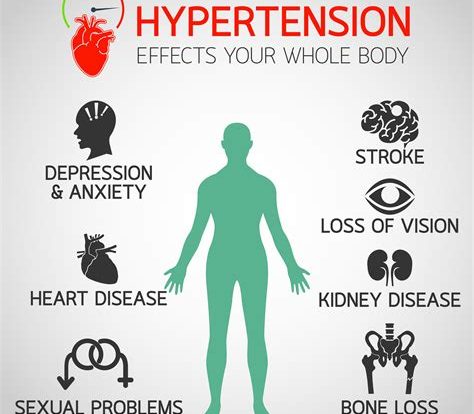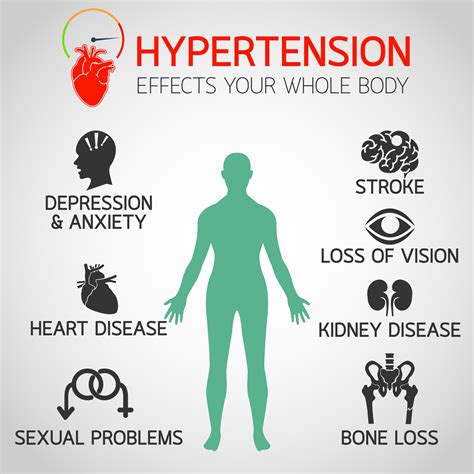

Hypertension is a chronic medical condition characterized by high blood pressure, which increases the risk of heart disease and stroke.
Hypertension, also known as high blood pressure, is a common health issue that affects millions of people around the world. It’s a silent killer that often goes unnoticed until it’s too late. According to the World Health Organization (WHO), hypertension is the leading cause of premature death worldwide. Fortunately, it’s a condition that can be managed and controlled with proper treatment and lifestyle changes. In this article, we’ll explore the causes, symptoms, and treatments of hypertension, as well as provide some tips on how to maintain a healthy blood pressure level.
Daftar Isi
The Silent Killer: Understanding Hypertension
Hypertension, or high blood pressure, is a medical condition that affects millions of people worldwide. It is often referred to as the silent killer because it typically has no noticeable symptoms but can lead to serious health complications if left untreated. In this article, we will explore what hypertension is, its causes and risk factors, how it is diagnosed, and what treatments are available.
What is Hypertension?
Hypertension is a condition in which a person’s blood pressure is consistently higher than normal. Blood pressure is the force of blood against the walls of the arteries as the heart pumps it around the body. A normal blood pressure reading is around 120/80 mmHg. Hypertension is defined as having a blood pressure reading of 140/90 mmHg or higher.
Causes and Risk Factors
There are many factors that can contribute to the development of hypertension. Some of the most common causes and risk factors include:
- Age
- Family history of hypertension
- Obesity
- Lack of physical activity
- Smoking
- High salt intake
- Stress
- Chronic kidney disease
Diagnosis
The only way to know if you have hypertension is to have your blood pressure checked by a healthcare professional. Blood pressure readings are usually taken using a sphygmomanometer, which is a device that measures the pressure in your arteries. Your blood pressure will be recorded as two numbers, such as 120/80 mmHg.
Complications
If left untreated, hypertension can lead to a number of serious health complications, including:
- Heart attack
- Stroke
- Kidney damage
- Vision loss
- Erectile dysfunction
Treatment Options
There are several ways to treat hypertension, including:
- Lifestyle changes, such as losing weight, exercising regularly, and reducing salt intake
- Medications, such as diuretics, ACE inhibitors, and calcium channel blockers
- Surgery, in rare cases where other treatments have been unsuccessful
Prevention
The best way to prevent hypertension is to live a healthy lifestyle. This includes maintaining a healthy weight, exercising regularly, eating a balanced diet, reducing salt intake, and not smoking. Regular check-ups with your healthcare provider can also help detect and manage hypertension early on.
Conclusion
Hypertension is a serious medical condition that affects millions of people around the world. While it may not have noticeable symptoms, it can lead to serious health complications if left untreated. By understanding the causes and risk factors of hypertension, getting regular check-ups, and making lifestyle changes, we can work to prevent and manage this condition and improve our overall health and well-being.
Hypertension, also known as high blood pressure, is a condition that affects millions of people worldwide. It occurs when the force of blood against the walls of your arteries is consistently too high, which can damage your blood vessels and increase your risk of heart disease, stroke, and other health issues. There are several factors that can contribute to the development of hypertension, including a diet high in sodium, lack of physical activity, obesity, smoking, and genetics. Although hypertension doesn’t have any obvious symptoms, it can lead to serious complications if left untreated, such as heart attack, stroke, vision loss, and kidney damage. Treatment options typically involve lifestyle changes such as increasing physical activity, reducing salt intake, and maintaining a healthy weight. Regular blood pressure screenings are crucial for detecting hypertension early on and preventing complications. Studies have shown that individuals with hypertension may be at increased risk of experiencing severe complications if they contract COVID-19, making it important for individuals with high blood pressure to take extra precautions to protect their health during the pandemic. Hypertension during pregnancy, also known as preeclampsia, can pose serious risks to both the mother and baby, emphasizing the importance of regular prenatal care and close monitoring of blood pressure.High blood pressure, also known as hypertension, is a common condition that affects millions of people worldwide. It is often referred to as the silent killer because it can go unnoticed for years and cause serious health problems if left untreated.Pros of Hypertension:- It can be managed through lifestyle changes such as maintaining a healthy diet and exercising regularly.- Early detection and treatment can prevent or delay complications such as heart disease, stroke, and kidney failure.- Medications are available that can effectively lower blood pressure and reduce the risk of future health problems.Cons of Hypertension:- Many people with hypertension do not have any symptoms, which can lead to a lack of awareness and delayed diagnosis.- Some medications used to treat hypertension can have side effects such as dizziness, fatigue, and sexual dysfunction.- Lifestyle changes can be difficult to maintain and may not always be effective in controlling blood pressure.As a journalist reporting on hypertension, it is important to raise awareness about the risks and benefits of this condition. While hypertension can be a serious health concern, it is also manageable with the right treatment and lifestyle changes. By educating the public about the importance of monitoring blood pressure and seeking medical attention if necessary, we can help prevent the devastating consequences of uncontrolled hypertension.
As a journalist, it is my duty to inform and educate the public about pressing health issues such as hypertension. Hypertension, also known as high blood pressure, affects millions of people worldwide and can lead to serious health complications if left untreated. Therefore, it is crucial that we take measures to prevent and manage this condition.
Firstly, it is important to understand what causes hypertension. High blood pressure can be a result of various factors such as genetics, unhealthy lifestyle choices, stress, and underlying medical conditions. Therefore, it is essential that we adopt healthy habits such as regular exercise, maintaining a balanced diet, managing stress levels, and avoiding smoking and excessive alcohol consumption.
In addition, it is recommended that individuals regularly monitor their blood pressure levels, especially if they have a family history of hypertension or are at a higher risk due to other health conditions. This can be done by visiting a healthcare professional or by using a home blood pressure monitor. It is also important to follow any prescribed medication as directed by a healthcare provider.
In conclusion, hypertension is a serious health issue that requires attention and management. By adopting healthy habits, monitoring blood pressure levels, and seeking medical care when necessary, we can prevent and manage hypertension effectively. Remember, prevention is key, and taking care of our health should always be a top priority.
Video hypertension
As a journalist, I have come across several questions related to hypertension. Here are some of the most frequently asked questions and their answers:
-
What is hypertension?
Hypertension, also known as high blood pressure, is a condition in which the force of blood against the walls of your arteries is consistently too high. This can lead to serious health problems, such as heart disease, stroke, and kidney failure.
-
What are the symptoms of hypertension?
Most people with hypertension do not experience any symptoms. That’s why it’s often called the silent killer. The only way to know if you have high blood pressure is to get it checked regularly by a healthcare provider.
-
What are the risk factors for hypertension?
Several factors can increase your risk of developing hypertension, including:
- Age (the risk increases as you get older)
- Family history of hypertension
- Being overweight or obese
- Lack of physical activity
- Smoking
- High salt intake
- Stress
-
How is hypertension treated?
Treatment for hypertension typically involves lifestyle changes and medication. Lifestyle changes may include:
- Following a healthy diet, such as the DASH diet
- Engaging in regular physical activity
- Limiting alcohol intake
- Reducing stress
- Quitting smoking
If lifestyle changes alone are not enough to lower your blood pressure, your healthcare provider may prescribe medication.
-
Can hypertension be prevented?
While there is no surefire way to prevent hypertension, there are several things you can do to reduce your risk:
- Maintain a healthy weight
- Eat a healthy diet
- Engage in regular physical activity
- Avoid smoking
- Limit alcohol intake
- Manage stress
- Get regular blood pressure checks






